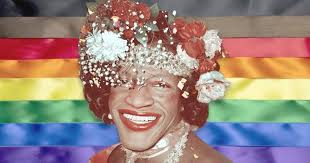Marsha P. Johnson, August 24, 1945 – July 6, 1992
“As long as my people don’t have their rights, all across America there is no reason for celebration.”

The East River State Park, located in Brooklyn, will be renamed after pioneering New York City LGBTQ activist Marsha P. Johnson (above). Photo Credit: More Color More Pride – Netflix.
Decked in vibrant colors, flourish attitude and flowing chiffon, Marsha P. Johnson held court in Manhattan’s Village. She was as vibrant and boisterous as the rainbow flag with quick wit like a political insider.
It was the 1960s and a whirlwind of change. Johnson rose to prominence, not just as a key player, but a force that put a lasting imprint on the Gay Liberation Movement.
A hot, New York summer night, Johnson crowded into the Village’s Stonewall Inn without fear, like she had so many nights before. More than a simple bar or watering hole, Stonewall was the premiere meeting place for New York City’s queer working class. At a time when drag dressing was outlawed, Stonewall gave refuge to the city’s forgotten – yet most vibrant – souls.
With marginalized communities their easy prey, police raided the bar unannounced in the dead of the night. But their hopes for a quick seizure of its patrons were thwarted when the spirit of rebellion encapsulated the crowd. Refusing to be second class any longer, the community struck back.
Johnson reportedly raised a defiant hand and threw a shot glass at a mirror. It was later known as the shot glass heard ‘round the world. As the glass shattered and fell to the floor she proclaimed, “I got my civil rights!”
Now known as the Stonewall Uprising of 1969, the multi-day rebuke of authoritarian policing of the body, birthed the modern Gay Rights Movement and set the stage for diversifying a new generation of community activists.
Relentless in the pursuit of equity, Johnson said, “Darling, I want my gay rights now. I think it’s about time the gay brothers and sisters got their rights. And especially the women.”
Alongside her sister in struggle Sylvia Rivera, she co-founded the Street Transvestite Action Revolutionaries (STAR) which sought to address the material and physical needs of femmes, transwomen, and other persons sidelined by the cisgender gay leaders who chased middle class heteronormative bridge building over intersectional change.
STAR was a radical political collective that provided housing and support to homeless queer youth and sex workers. Johnson was instrumental in the development of the Christopher Street Liberation Pride on the first Stonewall Uprising anniversary in 1970. That was the precursor to modern Gay Pride Parade.
Born in Elizabeth, New Jersey, Johnson was one of seven children and her father’s namesake. Like many trans and gender nonconforming people, Johnson chose her name after leaving home with newfound independence and confidence. Her life transcended the gender binary. She often quipped that the “P” in her name stood for “Pay it no mind” – her frequent retort when questioned about her gender identity.
Staring crowds and cameras in the eye with ease, Johnson spoke with confidence. “Her people” as she proclaimed, had been left behind, forgotten, sidelined, and at times subjected to violence. They existed in a realm not easily categorized or recognized by color, class, or binary.
Marsha became an ancestor of the movement at 46, beating the average lifespan of transwomen in the United States by eleven years. Tragedy, suspicion, and unanswered questions surround her death like many of her sisters. Most may never know the truth of the circumstances. The twenty-first century saw more women like her rising in visibility, yet still hunted by outdated viewpoints on who deserves to live without worry.
In 2019, The New York Times reported on New York City officials’ plan to erect a statue in Johnson’s honor near Stonewall Inn. A year later, New York Governor Andrew Cuomo revealed plans to rename a Brooklyn park after her.
Best to give deserving souls their flowers while they are alive to hold them. But, Johnson’s influence, spirit, and courage prove that the true test of a flower is to revel in the seeds that it leaves behind.



